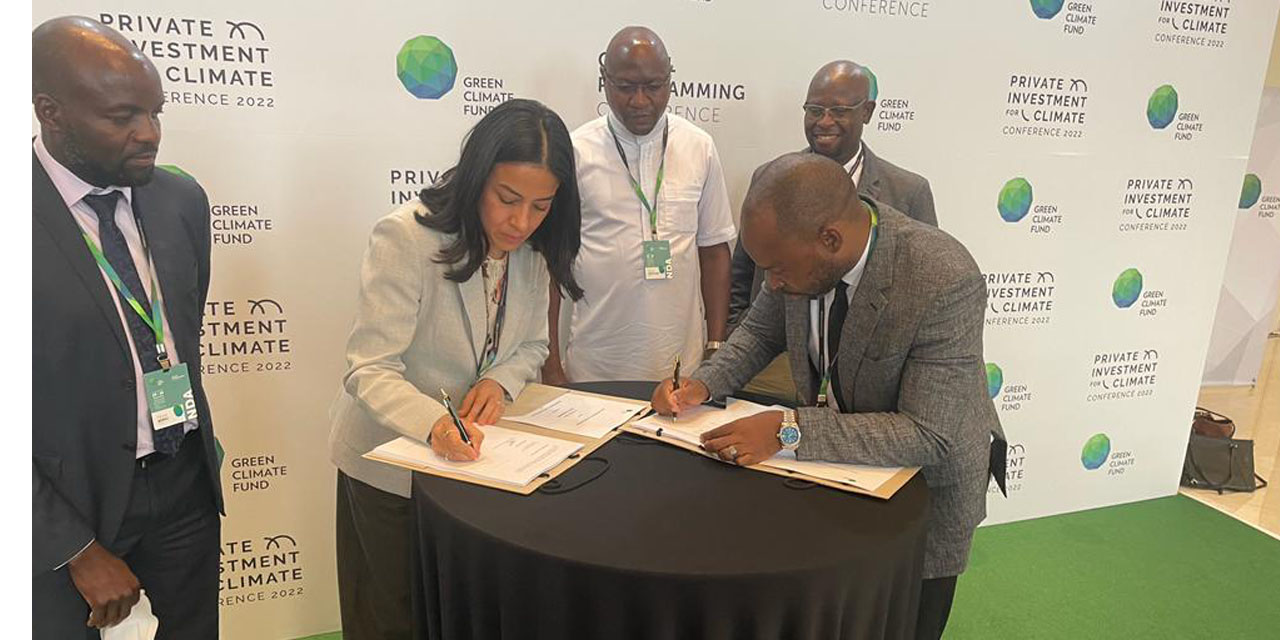Martin Endjala
The Environmental Investment Fund of Namibia has penned five-year accreditation master agreement extension with the Green Climate Fund.
The re-accreditation signed yesterday between the two funds comes after the EIF’s five-year term lapsed in June 2021.
The re-accreditation was preceded by a rigorous institutional review and assessment of the Fund by the GCF secretariat.
The signing of the accreditation master agreement shows that the EIF of Namibia is recognized
as maintain global standards, competence, and governance systems to access the financial resources of the GCF.
It is also said to demonstrate the cooperation, commitment and dedication of government of the
Republic of Namibia but more specifically the Ministry of Environment, Forestry and Tourism, as well as the Ministry of Finance, Office of the President, Ministry of international Relations and
Cooperation, National Planning Commission, Office of the Attorney, Developmental and Multilateral partners.
In addition, the re-accreditation assessment process took into consideration the fiduciary standards, good governance, transparency, leadership and risk management, which include environment and social governance (ESG) system and financial management systems of the EIF and all other applying institutions.
The GCF funding is mainly provided in a form of grants to finance climate change related programmes, which among other include those relating to renewable energy generation, food and water security, as well as ecosystems services, forest, and land use, increase resilience of rural livelihoods (e.g. aquaculture, conservation agriculture, rangeland management, climate resilient infrastructure, value addition, etc.) and sustainable urban transportation.
This is dependent on the submission of bankable and viable proposals according to certain criteria such as impact (contribution to the GCF results areas); paradigm shift potential with sustainable development potential; needs of the recipient countries and populations; coherence to a country’s existing policies or climate strategies; and the effectiveness and efficiency of the proposed intervention, including its ability to leverage additional funding.
According to Benedict Libanda, the Chief Executive Officer of EIF, the fund is well positioned to steer the country towards realizing the national development goals and eventually achieve a green economy that is sustainable.
However, the institution requires additional support to further build its capacity that will enable it to
access additional grant funding for Namibia.
The re-accreditation of the EIF of Namibia to the GCF is an important step in this process, in which the fund aims to raise funding from GCF totalling N$1.5 billion by the year 2026.
The fund further asserted that this type of funding will be used to create new and much needed industries that will support economic growth in areas such as rural development; renewable energy; water management; environmentally-sound waste management systems, sustainable agriculture; recycling; green technology industries; ecosystem-based businesses; environmental research, training, bursaries, and scholarships; and green value chains in the manufacturing sector.
These interventions are said to contribute to inclusive economic growth and poverty eradication,
employment creation, and food and water security.
It is estimated that a shift towards a greener economy in Namibia has the potential to create 3500 jobs within the next three years.
The GCF climate change resources accessed by the EIF thus far include climate resilient agriculture in
three of the Vulnerable Extreme Northern Crop-Growing regions (CRAVE) Project.
The project aims to reduce climate vulnerability, increase the adaptive capacity and resilience of
vulnerable small-scale farming communities in vulnerable extreme northern crop producing regions that are threatened by climate variability and change.
The total GCF grant envelop amounts to US$ 9.5 million while the Government of the Republic of
Namibia contributed US$500 000 co-financing.
The project is being executed by the Ministry of Agriculture, Water and Land Reform through an agreement with the Fund. This is a 5-year investment that covers the implementation period of 2016-2022 together with the Empower to Adapt-Creating Climate Change Resilient Livelihoods through Community Based Natural Resources Management in Namibia (CBNRM-EDA).
The project strives to empower rural CBNRM communities to respond to climate change in terms of awareness, adaptive capacity and low-carbon rural development.
The total grant envelope amounts to US$10 million and is fully capitalised by the GCF.
This is also a 5-year project that runs from 2016-2022. To date, the project has been allocated N$ 126 million in climate change adaptation funding directly to 33 community-based projects while it supports a combination of 38 conservancies and community forests.
The project will also provide for 77 000 rural area residents access of drinking water and also improve rangeland and ecosystem management practices of smallholder farmers under conditions of climate change in Sesfontein, Fransfontein, and Warmquelle areas of the Republic of Namibia (IREMA).
This initiative is exclusively ring-fenced for the drought-stricken Kunene and runs over a 5-year period from 2019 -2024.
The project is aimed at reducing the vulnerability of smallholder farmers under climate change conditions by safeguarding natural capital that generate ecosystem services to sustain agricultural production systems.
GCF investment in this case amounts to US$9.3 million and matched by the Namibian Government contribution of US$700,000.
Key activities include the development of an early warning system for disaster risk management, solar-retrofitting and rehabilitation of up to 20 boreholes, development of up to 300 backyard gardens and rehabilitation of Warmquelle and Khowarib Green Schemes.




